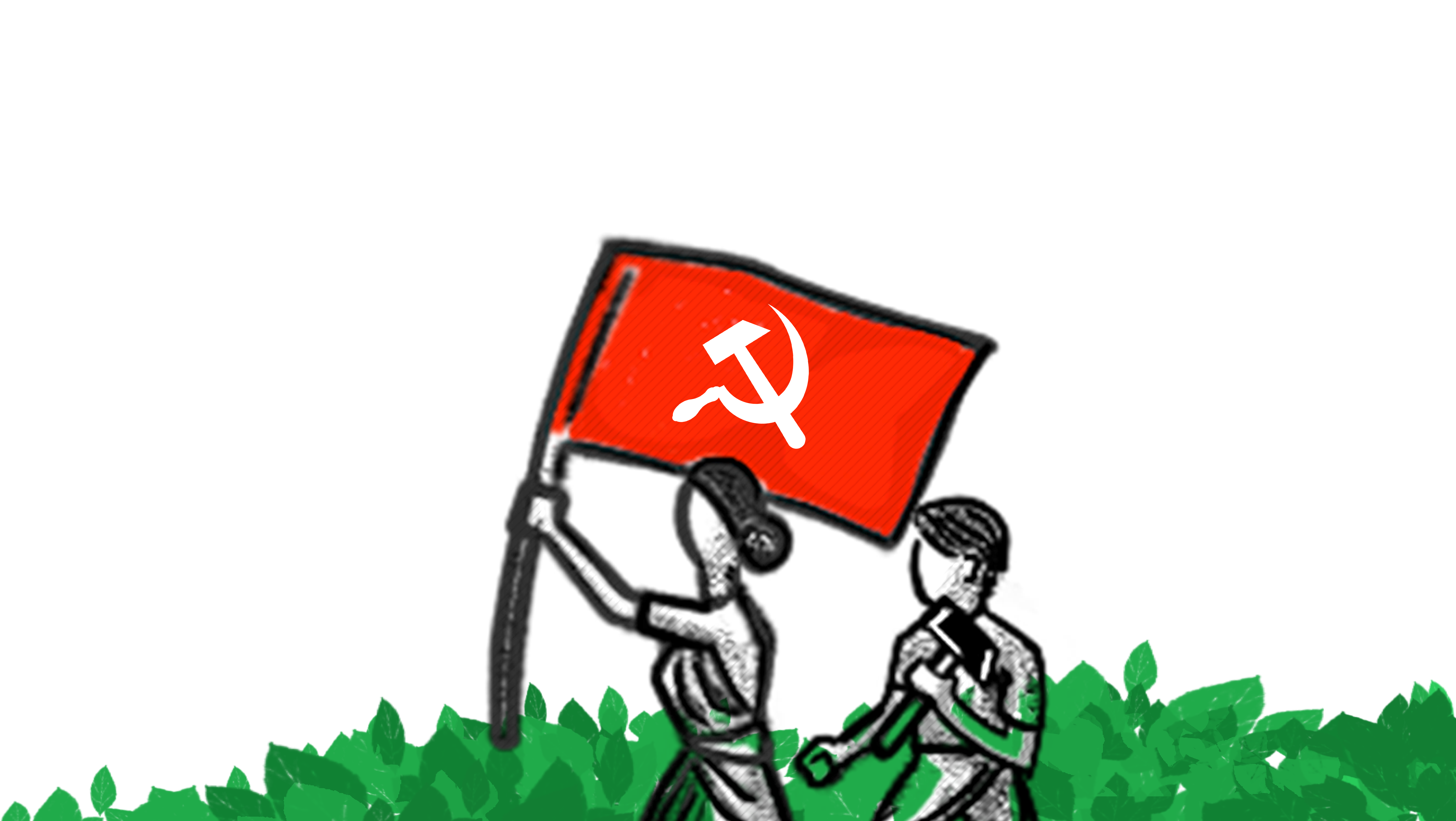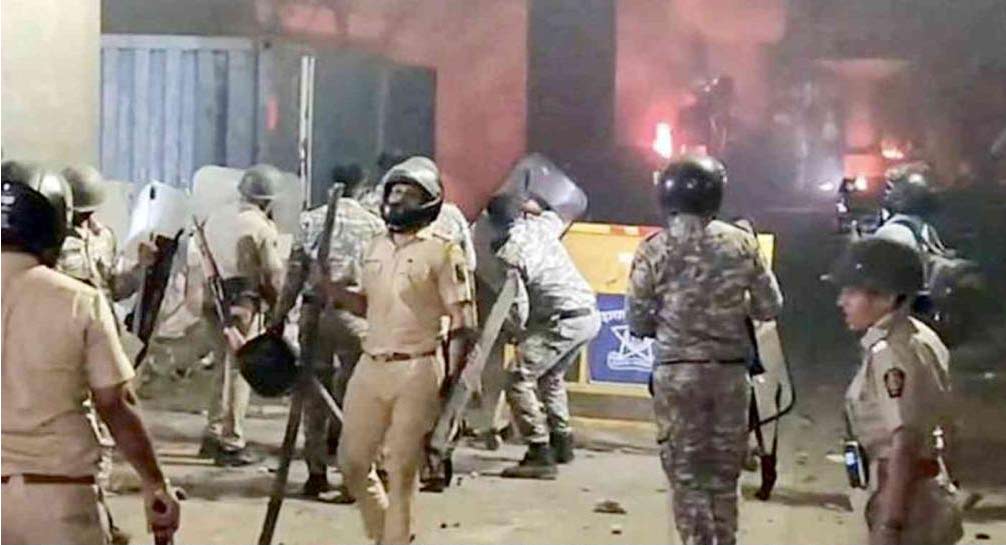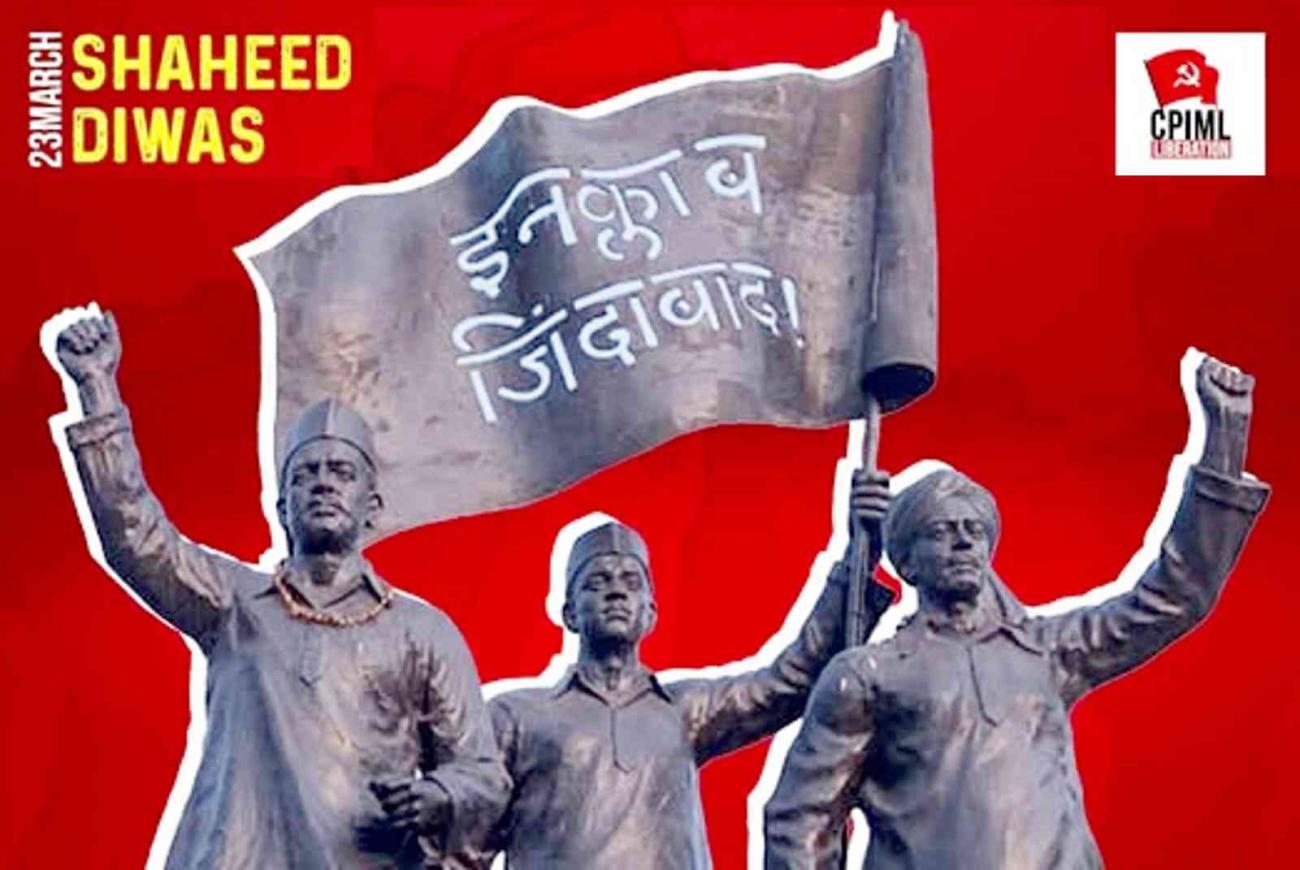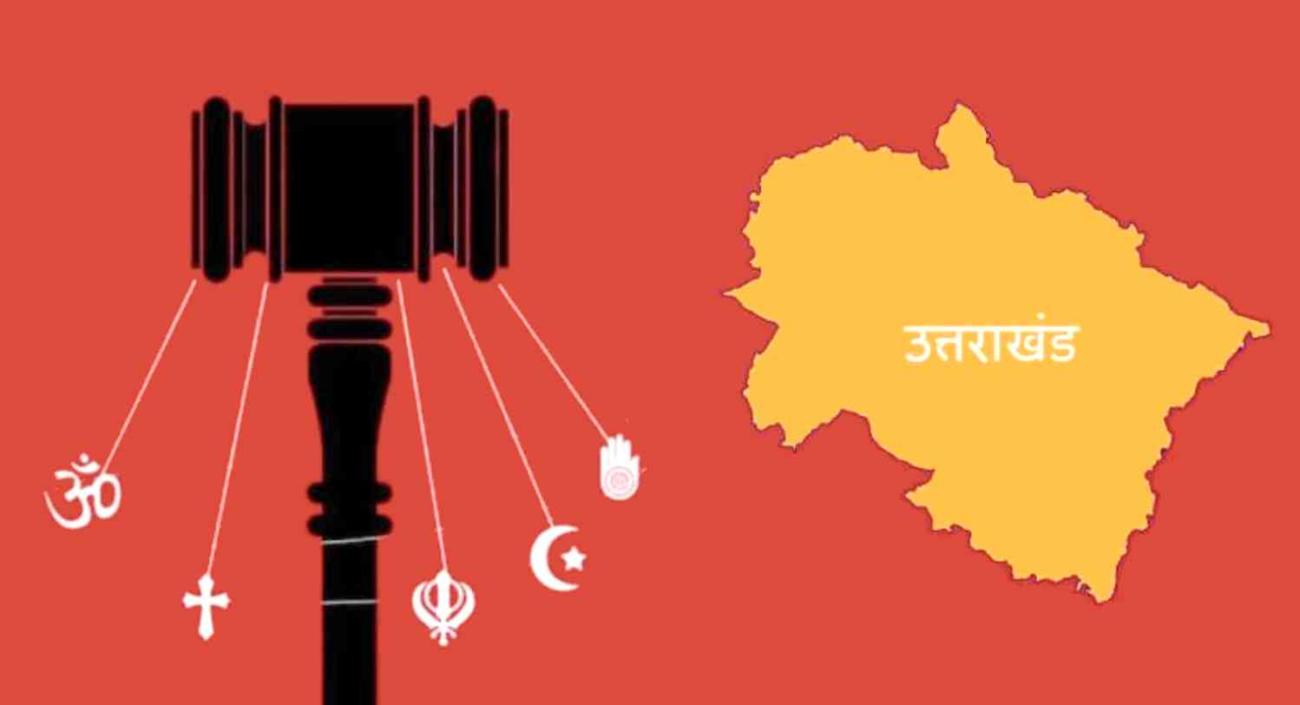The Bharatiya Nritya Kala Mandir complex was named after Rama Gairola for the occasion in memory of departed young AIPWA leader Rama Gairola. The hall was named after noted writer and activist, the late Mahashweta Devi and the stage was named after AIPWA Founding President the late Comrade Geeta Das.
On 13th November, the conference started with the hoisting of the AIPWA flag by veteran AIPWA leader Arti Devi, and tributes to martyrs and departed leaders of the revolutionary womens movement. Tributes were paid to the Naxalbari martyrs, those killed in the Bathani Tola and other massacres, Kamleshwari Kunwar, noted activist of the revolutionary Bhojpur struggle and life partner of Comrade Jagdish Master, Rama Gairola, Mahashweta Devi, Geeta Das, Chinta Singh, Jeeta Kaur, Ajanta Lohit, Aparna Tyagi, Siyamani Mukhiya, Manju Devi, Agni, Sheela, Lahri and others.
This was followed by the inaugural session of the Conference, which began with the rendering of songs by womens cultural teams Chorus (of Bihar) and Prerna (Jharkhand).
A reception committee headed by Prof. Bharti S Kumar welcomed all the guests and presented mementoes to noted activists of the womens movement, including senior academic and AIPWA mentor since its founding days Maya Bhattacharya, Neelam Katara who is an activist against honour crimes; Kashmiri writer and activist Natasha Rather, Nirjhari Sinha of Jan Sangharsh Manch, Gujarat, Vidya Dinker, activist from Mangaluru; Advocate Asha from Kerala, Sanjeela Ghising, leader of the Democratic Revolutionary Womens Federation, Darjeeling; and veteran activist of the revolutionary communist movement Comrade Meera.
The inaugural session was addressed by Neelam Katara, Natasha Rather, Nirjhari Sinha, Vidya Dinker, (see excerpts of their speeches below) and
AIPWA General Secretary Comrade Meena Tiwari. The inaugural session was conducted by AIPWA National Secretary Kavita Krishnan.
The delegate session of the Conference began with the delegates listening to a recording of a song composed and sung by the outgoing AIPWA National President Srilata Swaminathan. Comrade Srilata, who could not attend the conference because of ill health, was sorely missed by all, and her song was a celebration of AIPWA as a source of hope and strength for women.
AIPWA General Secretary Meena Tiwari presented AIPWAs work report and a note on the social and political situation in India and the world. The note observed that BJP and RSS forces are working to push back progressive shifts in consciousness that had been achieved by movements. They are poisoning the social and political discourse and trying to establish divisive, hate-filled and regressive ideas as normal and even nationalist.
These forces bully and beat up people while shouting slogans of Bharat Mata ki Jai (Victory to Mother India) but the same forces abuse and attack Indias women for demanding equality and freedom. They are deeply opposed to the demands of equality and rights: of workers, peasants, Dalits, Muslims and other minorities, and women. They are giving corporates a free hand to loot and plunder peoples resources and crush peoples rights, unleashing brutal repression on resistance movements. Governments run by other parties are also betraying womens aspirations and rights.
On the night of 13th November, Chorus presented a play, Paro, followed by a traditional Jharkhandi dance by the Prerna team and cultural performances by several other activists.
On 14th November, delegates from all over the country discussed the issues facing the womens movement and shared experiences of their struggles. The note was adopted unanimously after discussion in the house.
The delegates then elected the new AIPWA leadership, including a 101-member National Council. Comrade Meena Tiwari was reelected National General Secretary, Comrade E Rati Rao was elected National President; Prof Bharti S Kumar, Tahira Hasan, Farhat Bano, Iqbal Udasi, Pratima Engheepi, Krishna Adhikari, Raju Barua and Saroj Chaubey were elected Vice Presidents; and Prof Sudha Choudhary, Indrani Dutta, R Nagamani, Geeta Mandal, Shashi Yadav and Kavita Krishnan were elected National Secretaries.
Addressing the delegates at the end of the Conference, newly elected AIPWA President Rati Rao said that just as Dalits were refusing to perform caste-based labour, it was high time women also refuse to do our gender based traditional work. She stressed the need to uphold a Marxist perspective on the womens movement and also draw strength and insights from the writings of Dr Ambedkar, Jyotiba and Savitribai Phule, Periyar and Bhagat Singh as we address class, caste and gender issues together and confront fascist Hindutva forces.
The story of Kunan Poshpora is not only one of rape but of resistance
(During the movement following the December 2012 Delhi gang rape, Kashmiri activist and researcher Natasha Rather and 4 other young Kashmiri women Essar Batool, Ifrah Butt, Munaza Rashid and Samreena Mushtaq discussed the Kunan Pushpora incident. They along with 50 women filed a PIL in court and got the Kunan Pushpora case reopened. These 5 women together wrote a book, Do you Remember Kunan Pushpora? Below are excerpts from Natasha Rathers remarks at the AIPWA Conference.)
Im from Kashmir, which India considers its integral part. On news channels we see panel discussions every evening in which some journalist or expert expresses their opinions about Kashmir. But we hardly ever get to hear what Kashmiris themselves feel about Kashmir. I dont consider myself a part of India, I identify myself as a Kashmiri and when I address you all, I identify all of you as Indians. Ive noticed that everyone but Kashmiris have the right to express their opinions on Kashmir, but we Kashmiris are allowed very little right to express our opinions. When Kashmiris do not get a space to speak, the result is whats happening now in Kashmir: people are coming on to the streets to protest with stones in their hands.
The story of Kunan Poshpora is not only a story of mass rape in a village. It is not only a story of how one night the jawans of 4th Rajputana Rifles, during a cordon and search operation in a village, raped the women of the village. The story is that of those women stood up against that atrocity, told the world about that rape, because they did not want that what they were subjected to should be repeated in other villages.
This incident took place in 1991, when cordon and search operations were very common in Kashmir. The Indian Army would cordon off the men of village from the women, gather them in a field, and subject them to torture in the name of a search. Women would be left alone in the village and quite often they were subjected to rape or molestation. But women rarely came forward to complain. In Kunan Poshpora, during the cordon and search operation, the women of the village were gang raped while the men were being subjected to torture. The villagers took a collective decision to complain. In 1991, and even now, it is not easy for women to speak of rape or anything sexual in Kashmiri society. But the men of Kunan Poshpora supported the women who filed complaints of rape.
As soon as the complaints were filed in this case, the entire system including the Indian administration and judiciary joined hands to suppress the case. We four other women and myself, as well as the larger group of 50 women are often given credit for having reopened the Kunan Poshpora case. But I want to say that the credit does not belong to us. It belongs to the women who decided to fight this case, without anyones support.
From 1991 to 2000, this case was hushed up. There was much evidence for this case but the police ignored it all and closed the case. In 2004, the rape survivors approached the State Human Rights Commission, and they got a reply in 2011, and an order to reopen the case it is that order that we took forward. The struggle of Kunan Poshporas women is a reminder of womens strength. If they choose, they can face the troubles and take their struggle forward.
We just heard Neelam ji speak about women facing violence in the name of honour. We know how women in every section of South Asian society are made to bear the burden of honour. It is this honour that the Indian Army soldiers targeted at Kunan Poshpora and other places. What the women of Kunan Poshpora showed was that by targeting women to attack the honour of the struggling people, you cannot wound their spirit.
This is the fifth month of the lock-down and struggle in Kashmir. People are being killed, more than 15000 are injured, more than 1000 have been blinded. It is women who suffer the consequences of all this. Since the early 1990s Kashmiri women have set an example of resilience that we are following even today.
I am very happy to see today that we arent alone in fighting a battle. If we fighting women come together and recognize our strength, we can move closer towards a very progressive society, a revolution.
Struggles for Justice and Rights in Gujarat
(Excerpts from Nirjhari Sinhas remarks at the AIPWA Conference)
Gujarat had traditionally been a society of small traders, where communal violence had never been very widespread. But with Modis ascendance, even Dalits and adivasis were turned against Muslims. We Jan Sangharsh Manch had been working since 1979, raising workers issues and right to shelter issues. Since 1989 we also began raising some human rights issues. But post 2002 we found that our Trade Union suffered a vertical split over communalism. Thats when we felt we had to counter communalism.
We were the ones who presented evidence against Maya Kodnani who along with Babu Bajrangi was eventually convicted in the Naroda Patiya case. We struggled against the draconian POTA law. Subsequently, there was a series of fake encounters, done by the Gujarat police to promote the political myth that Narendra Modi was a target of Muslim terrorists. We struggled to demand justice in the Sohrabuddin encounter and the rape and murder of his wife Kauser Bi, the fake encounters of Tulsi Prajapati and Sadiq Jamal and Ishrat Jehan.
In 2014, the death of Mukul Sinha was a setback for us. Now, in Gujarat, we may not agree with the demand of the Patel agitation but theres no denying that their protest reflects the hollowness of the famed Gujarat model. The Dalits are also fighting back.
We took up the issues of Dalit corporation workers who do sanitation and malaria prevention work. After husbands die, wives take up this work so there are many women in this word, which is very unsafe and has a high death rate. We demanded that these workers who have been working on contract for a decade and a half, should be made permanent. These women declared they would not be responsible for Swachchata (cleanliness, key concept in PM Modis Swacch Bharat Clean India - drive), whoever wants to be clean can do it themselves. They went on strike. At night the Government and police made the BJP-backed organization do the sanitation work. After a month, the Government was tired out, they called us and promised our leaders that within three months they will make the Dalit sanitation workers permanent.
Modi says the country is marching ahead actually his demonetization move is taking India back to an era of long queues! We should give a slogan of Stand Up India Against Demonetisation!
Down With Patriarchy! Down With Casteism! Down With Communalism!
“Honour crimes are an attack on womens right to choice”
(Neelam Kataras son Nitish was killed in 2002 by the sons of criminal politician DP Yadav, because he was in love with Yadavs daughter Bharti. Excerpts from Neelam Kataras speech at AIPWA Conference)
What is an honour crime? Such crimes are extremely gendered acts of violence against the fundamental rights of women, often young women, to forge relationships of their own choice and live a life of dignity. We can remember how the farmers leader Tikait said, Only a prostitute chooses her own partner. So even if any woman marries of her own choice, she is not perceived as a good woman even now.
Unfortunately I had to hear the Sessions Court judge ask, “How is this an honour crime? Daughters are killed in honour crimes, but here your son was killed.” Even in the Supreme Court I was asked by way of argument, How can your sons killing be an honour killing? You are from a good caste. I was shocked that a Supreme Court Bench should use terms like good caste.
The UN General Assembly in 2001, 2003 and 2005 have stressed the need for social, legal and educational interventions to stop the widespread practice of honour-based crimes and ensure stern punishment for the perpetrators. The United Nations has recommended many times that each country have a law against honour-based crimes. Several countries already do have laws, but even there, there are loopholes through which the perpetrators escape. Honour-based crimes are confused with crimes of passion. The other mask for such crimes is that of tradition and culture. In our country whenever something is done in the name of culture everyone falls silent. What kind of country or nation or society boasts of a culture that allows and celebrates murder of ones own children?
On 6 October 2016, Pakistan amended its law to state that honour crimes are crimes against the State and cannot be pardoned by the victims family, and will carry a minimum sentence of 25 years; if the victims family pardons the offender, however, he will not be hanged.
Our country has no law for such crimes and no one seems to want to exact a law for such crimes! In 2003, soon after my sons murder, a politician (SS Ahluwalia of the BJP ed/) who was then an MP and now a Minister for State in the current Central Government, told the UN that honour crimes did not take place in India. When the Government changed the next year, the new Government said, Alright, such crimes do take place but theres no need for a separate law.
The Supreme Court verdict in my sons case is a landmark. It set the sentence as 25 years more than the ordinary life sentence term that allows remission after 14 years. Earlier verdicts said that inter-caste must be encouraged because we need to come together and destroy the concept of caste. The verdict in my sons case is significant because it clearly says that such crimes are a violation of womens right to choice. The judges have said “One may feel 'My honour is my life' but that does not mean sustaining ones honour at the cost of another… Her individual choice is her self-respect and creating dent in it is destroying her honour. And to impose so called brotherly or fatherly honour or class honour by eliminating her choice is a crime of extreme brutality… It is a vice, condemnable and deplorable perception of “honour”, comparable to medieval obsessive assertions.”
The SC for the first time understood and upheld womens right to choice. It is important for all of you to understand and explain this to society at large. You must first be convinced of it yourself. I know a lot of people in high society who say, “If my child marries outside the caste it is ok but ideally marriages should take place within the caste.” So, even if you pay dowry and are humiliated you want caste-based marriages and disapprove if a man from another caste or faith respects your daughter and wishes to marry her, you dont like it. First ask yourself, will you or will you not like it if it were your own daughter and if not, ask yourself why not. Only because its been like this for ages? Were planning to observe December 10 (International Human Rights Day) in Delhi to demand a law against honour crimes, to say that if a law is made it will provide a definition and will deter such crimes.
Lets Wage Love Jehad For Equality, Fraternity!
(Excerpts from Vidya Dinkers remarks at the AIPWA Conference)
We need to understand who stands behind the ambassadors of patriarchy and fascism. Who is behind Modi? Who is pulling his strings?
Modi is announcing and pushing Smart Cities projects and Economic Corridors 150 kilometres on each side of Railway lines, allowing corporate land grab. We are living in a corporatocracy not a democracy. There is a Sagar Mala project seeking to link our ports and port cities. 45% of Indias land is going to go to these projects. Imagine the impact on the people! Not only on land owners, but on us all. The industrialists, hotels etc will soak up all the ater! Just as we are in queues for cash today, we will be in queues for water tomorrow!
They try to keep us busy in religion and communalism to do the corporate plunder undisturbed! The saffron outfits drag Hindu-Muslim couples to the police station and the police wont question the Bajrang Dal or Hindu Jagran Vedike or Durga Vahini etc, they will question the couple!
Recently, Durga Vahini declared that women who visit temples must either wear saris or salwar kurtas with dupatta. Why? They said, else the devotees will look at you and not at God. So I replied, but the priest is topless, he is distracting me! Why doesnt he also dress decently? I am ending up looking at him not at God!
These people brand inter-faith relationships as love jehad. Well, lets embrace the term. I am telling the young women here, fall in love! If we want Dr Ambedkars dream of equality and fraternity to be achieved, let Hindus, Muslims, Christians fall in love with each other without hesitation, across class, caste and religious boundaries! This would be the beginning of a revolution! Let us ourselves wage a jehad of love! And if we want to fight Smart Cities, Sagar Malas, Economic Corridors, we must deeply love our streets, our fields, our street vendors! Love Jehad Zindabad !





